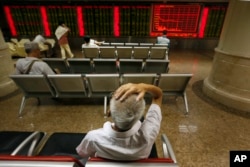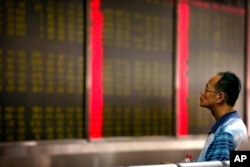China’s one-day plunge Monday, and slide of 12 percent last week, has surprised many analysts and is raising questions about the effectiveness of the Communist government’s massive intervention efforts to prop up the index over the past two months.
The 8.5 percent plunge of China’s main index Monday, its sharpest fall since 2007, highlights growing investor dissatisfaction with government moves to boost the index and weakening confidence in the economy, analysts said.
There is still a lot of downward pressure on the market and investors are testing just how far the government will go in its support, said Shawlin Chaw, a senior analyst at Control Risk in Shanghai.
The persistent government intervention that began when the market first started to dive "appears to be losing its strength," Chaw said.
Perfect storm
Chaw said that what is happening now is in part a reflection of the market responding to fundamentals.
“What happened today is like a perfect storm,” Chaw said, adding that the slide is a confluence of different forces such as the weakening Chinese economy, dissatisfaction with government intervention and the turbulence in global markets.
Many expected government moves over the weekend, including allowing pension funds to invest in stocks for the first time Monday, to help boost share prices.
Since June, when the market slipped more than 30 percent, the government has been announcing measures to help prop up the index. This includes flooding the market with funds through state-owned enterprises, which resumed their activity on Monday.
But both the actions by state-owned enterprises in the market and policy announcements by the government appear to be falling on deaf ears.
On Monday, many stocks tumbled by their 10 percent daily limit, with only a few closing in the black.
Analysts say its time that the Chinese government paid more attention to reviving the economy, instead of wasting its energy and taxpayer money on protecting the index.
The government needs to “think about what it should possibly do to revive the economy as a whole rather than just delivering some measures to boost the market index or revive investor sentiment,” said Raymond Yeung, a senior economist with ANZ in Hong Kong.
Bad habit
On Monday, China shares erased gains that followed the government’s massive intervention in the market in early July when the central authorities pledged to provide “ample liquidity” to aid the plunging stock market.
The government’s persistent efforts to boost the market since then have created what some analysts have said is a bad precedent because investors are expecting the government to bail out the market every time there is a crisis.
Anil Gupta, a business professor at the University of Maryland, questioned the government’s wisdom in continually intervening in the market.
Gupta argued that by intervening, the government is preventing investors from learning their lessons.
“Unless you say the intervention will continue, the ending is not going to be pretty,” he said.
Analysts said the government's persistent intervention in the market is driven by a strong desire to show that “everything is under control” with the Chinese economy.
On target
The government said China’s growth is still on target for 2015, at about 7 percent. But a steady stream of bad news about the economy is raising concerns that the situation is not so favorable.
The worsening economy has not only sent shockwaves through markets overseas in recent days, but is also impacting sentiment at home. And this is creating an image problem for the government.
China is preparing to showcase its military strength and growing influence in the region, as well as the party’s overall control, when it hosts a massive parade to mark the end of World War Two early next month.


